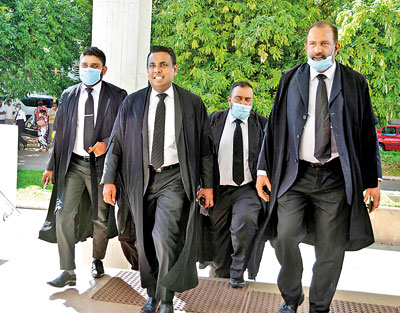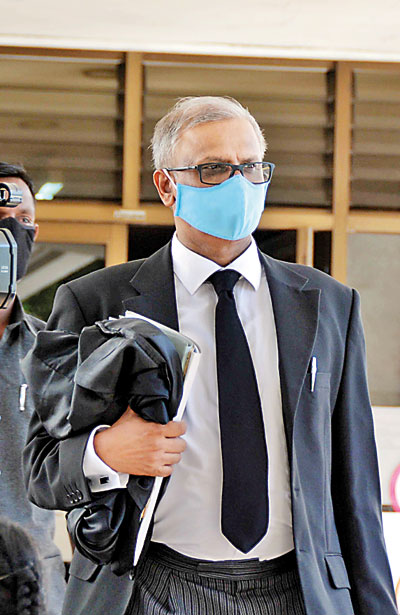News
Dispute over polls date and dissolution: Petitions dismissed, Supreme Court restores status-quo-ante
After ten days of hearings, the Supreme Court, in a unanimous decision, has dismissed eight Fundamental Rights (FR) petitions that had challenged the validity of the March 2 Presidential proclamation dissolving Parliament and refused the petitioners leave to proceed.

Lawyers representing intervenient petitioners arriving at the Supreme Court complex on Tuesday.
Incidentally, the judgement day, Tuesday, coincided with the end of the three-month period during which a new parliament had to be convened in terms of the March 2 presidential proclamation.
The five-judge Bench, in a majority decision, also overruled all preliminary objections submitted against the petitions.
The Bench comprised Chief Justice Jayantha Jayasuriya and Justices Buwanaka Aluvihare, Sisira de Abrew, Priyantha Jayawardena, and Vijith Malalgoda. The hearings were held in the spacious ceremonial court room in keeping with the health guidelines related to the Covid pandemic.
Minutes after Chief Justice Jayantha Jayasuriya dismissed the petitions, the news was welcome by the sound of firecrackers in several towns and in places not far from the court complex.
Addressing the Court on Monday, the petitioners’ lead counsel M.A. Sumanthiran summarised the submissions made during the hearing and countered the arguments put forward by the lawyers representing the respondents and fifteen intervenient petitioners with regard to locus standing, non-joinder of essential parties and time bars.
He said the arguments of lawyers representing the respondents and the intervenient petitioners were based on political opinions but he would purely stick to the law. His common summary of submissions went on for more than four hours.
Noting that Constitution’s Article 17 referred to a unique fundamental right as compared to Article 126 that ensures other rights including language, Mr. Sumanthiran pointed out that this constitutional provision had made access to this Court itself a separate fundamental right. He referred to past judgements and told court that even though the President enjoyed complete immunity as a person while in office according to Article 35, his acts could be reviewed by the Court.
Pointing out that five counsel were appearing for four respondents named in the applications where President was represented by the Attorney General and a private lawyer while three separate counsel represented the Election Commission, Mr. Sumanthiran said this amounted to procedural impropriety. “This is an application against the State, which is required to guarantee and protect the rights of citizens in addition to ensure democratic governance.”

The petitioners' lead counsel M.A. Sumanthiran says he will respect the ruling by the five-judge bench
He said one of the major functions of the apex court was to interpret the law of the land by advancing constitutionalism, the rule of law and democratic governance.
He also said the election machinery had not moved since the names and numbers of the candidates had not been published in the gazette as required by law.
Additional Solicitor General (ASG) Indika Demuni de Silva told the bench that all 7,000 names of the candidates had been published on the website of the Election Commission. Counsel Sumanthiarn pointed out that section 24 (1) of Parliamentary Elections Act specifically required that they should be published in a gazette notification, not on the website.
Describing the current curfew as a ‘de facto curfew’ since there were no legal documents available to show freedom of movement had been restricted, counsel Sumanthiran told court that despite the curfew on Sunday, he went to Hatton and returned to Colombo. “That’s the state of the rule of law in this country.”
Contesting counter submissions made with regard to accepting nominations on March 16, 17, 18 and 19 which were declared as public holidays – or dies non —, he argued that as per the Section (5) of the Holidays Act no act carried out on such hays could be legal. He told court that since the original act was in English, it should be considered for the interpretation.
“The Holidays Act has not been translated to Tamil or Sinhala to this day. It is only in English. Since the enabling Act is in English and gazettes are published in all three languages based on that, why does one look at other languages for interpretation?” Mr. Sumanthiran asked, recalling one of his FR cases that had cited the Holidays Act.
The Bench was also told that when the FR petitions challenging Parliament’s dissolution by the previous President in 2018 were taken up, relief was granted by the Court within one and half days but the current sittings continued for ten consecutive days. He also noted that the sitting Chief Justice was then invited to represent the President in his capacity as the Attorney General.
Chief Justice Jayantha Jayasuriya intervened to ask the counsel whether he was making any comparisons between the two sittings. Mr. Sumanthiran replied that since the current case involved a complicated constitutional crisis compared to the one in 2018, he was grateful for allocating a Divisional Bench and granting adequate time for counsel to address the Court.
Justice Priyantha Jayawardena pointed out that the 2018 constitutional crisis followed by early Parliament dissolution was a straightforward legal dispute compared to the present case. He recalled, the late Justice Prasanna Jayawardena who was on that Divisional Bench even asked why the Court even had to take a day and half to grant leave to proceed.
The Court was informed that Parliament could not be inactive longer than two months after prorogation by the President. On the same principles, Mr. Sumanthiran argued that as Parliament automatically automatically becomes active after two months of prorogation, a dissolved Parliament also comes into active mode after the three-month mandatory period if no new Parliament is constituted. “What is void is void. If the prorogation exceeded two months, you don’t need a Court to declare it as void but it is always useful to have a Court to declare it,” he said.
He told that in several countries courts had held that Parliament was a living institution even during dissolution and therefore could be recalled. Mr. Sumanthiran said the judgment given by a seven-judge Bench in the 2018 dissolution case had held that the President was ‘mandatorily required to summon Parliament within specified time frames” in accordance with Articles 72, 73, 75, 76 and 77 of the Constitution. “What’s more? With utmost respect, your Lordships have already held that it is mandatory to reconvene Parliament?” he said.

Government supporters celebrated the judgement by lighting firecrackers. Pix by Indika Handuwala
To prove his case that the March 2 dissolution of parliament was no longer valid and ineffective in law after three months period, he presented to the bench three identical documents of the gazette notification consisting of three dates: the date of dissolution of parliament (March2), the date of the election (April 25) and the date for the new parliament to convene (May 14).
Then he cited the notification whereby a new election date of June 20 had been fixed by the Election Commission. In this notification only the dissolution date had been mentioned. Mr. Sumanthiran took it up as his position to point out that except the dissolution date, other dates had lapsed over the time therefore a proclamation could not be considered as legally effective since it should have all three elements to be valid.
“What we are facing today is a threshold of a great infringement, perhaps the greatest infringement that this Court ever had to face. I say this with utmost respect to the Court. Because it involves an institution through which this Court derives its authority for judicial power,” he said, stressing that Parliament, as an institution that exercises people’s sovereign power, is vested with legislative and supervisory powers in addition to being a check against the Executive in defining this country as a democracy.
In concluding remarks, he noted the three month mandatory period lapsed on June 2 and again referred to the 2018 Supreme Court judgement which held that time frames specified in the Constitution including the three-month period to constitute a new Parliament were mandatory.
Laksiri Mendis, a legal academic on Constitutional law, who appeared in person as an intervenient petitioner last week told the Courts that interpretation of mandatory and directory legal provisions with regard to dynamic or purposive rule had been upheld by the Court in the past on the basis of ‘fairness’. He argued, at times, the word ‘shall’ had been interpreted as ‘may’ or vice versa.
Counsel Mendis earlier submitted that the relevant Constitutional provisions could be read together with the Parliamentary Elections Act 1981 to adopt a harmonious interpretation where an interpretive approach could be justified since the President was empowered to re-fix a new date for the summoning of the new Parliament under Article 70 (5)(c).
The Election Commission’s counsel Saliya Peiris PC was also permitted to address the Court as the Commission had come under severe criticism by the intervenient petitioners. The allegations against the EC included that EC members were working in collusion with the petitioners and that there were questions regarding the independence of the Independent Commission.
Renouncing these allegations, Mr. Peiris said the EC was mindful of the current situation and concerns that the country could not go on for a long period without holding the polls but the Commission’s top priority would be ensuring safety and health of the voters during a global pandemic.
In response to the allegation that one of the commissioners was biased, Mr. Peiris said that having different opinions in a three-member Commission on a particular subject itself showed how independently the Commission operated with some even expressing their opinions in public.
Challenging the Presidential Secretary’s counsel who argued that the Commission had earlier instructed the Government to stop distributing the Rs 5000 monetary relief to the people affected by pandemic, Mr. Peiris told court that the Commission merely wrote to the Government requesting that the programme should not be used for political purposes following complaints that some candidates had taken part in such activities.
Government politicians and the petitioners, including Samagi Jana Balavegaya General Secretary Ranjith Madduma Bandara, were present when the Court delivered the order on Tuesday.
Coming out of the Court after the Order was delivered, the Government politicians welcomed the Court’s decision and said they hoped the polls would be held as early as possible and they would win comfortable victory to have a majority in Parliament.
Mr. Maduma Bandara said that although he was disappointed, he respected the judgement.
Mr. Sumanthiran told journalists that despite the setback, the struggle to establish democracy would continue.


